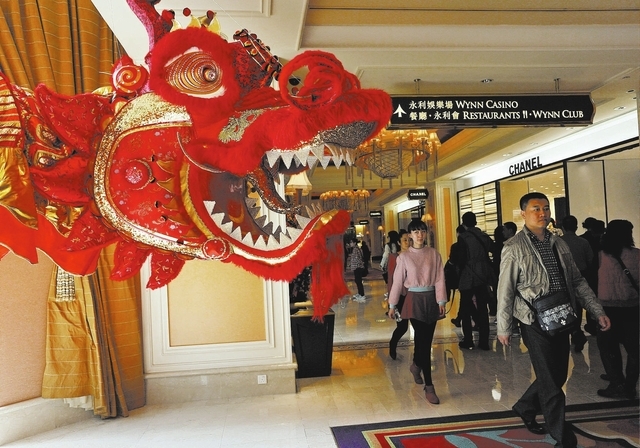Don’t bet against more growth in Macau gaming

Anytime the investment community gets downwind of a potential hiccup in the Macau gaming market, a slash-and-burn mentality sets in.
The victims are often MGM Resorts International, Las Vegas Sands Corp. and Wynn Resorts Ltd. The Las Vegas-based companies have subsidiaries listed on the Hong Kong Stock Exchange and those stock prices usually take a beating. Sometimes, the companies’ share prices on the New York Stock Exchange and Nasdaq suffer collateral damage.
In April, skittish investors worried about deteriorating liquidity in the high-end wagering credit market. A month earlier, it was fear that gamblers would stay home following the lucrative Chinese New Year holiday.
In both cases, the issues never materialized.
Macau casinos fell just short of reaching a third straight $4 billion revenue month in April, but still reported a 10.6 percent increase. March’s total was $4.4 billion, Macau’s third-highest-ever monthly gaming revenue figure.
Last week, media in Macau and Hong Kong reported a police crackdown down on illegal use of mobile card payment technology. Also, it was suggested the government might change its policy on allowing mainland Chinese to visit Macau.
The next day, share prices of the Hong Kong-listed Nevada casino operators fell 5 percent to 9 percent.
Wall Street, however, had one suggestion for investors: Breathe.
The Macau casino market shows no signs of backing off from another record-setting year.
Well Fargo Securities gaming analyst Cameron McKnight said the scary headlines’ effect was “likely misinterpreted.”
Stifel Nicolaus Capital Markets gaming analyst Steven Wieczynski said investors shouldn’t draw “broad sweeping conclusions” from the Chinese press.
For the first four months of 2014, Macau gaming revenue is up 17.5 percent over the same period of 2013. The total includes February’s record single-month revenue record of $4.8 billion.
In 2013, Macau casinos produced a record of $45.2 billion.
On Monday, McKnight predicted May gaming revenue could exceed the $3.7 billion collected a year ago by as much as 16 percent.
In other words, another $4 billion month.
“We remain positive on the longer-term Macau,” McKnight said.
The double helping of seemingly bad news came the day before Melco Crown — the casino operator controlled by Lawrence Ho and Australian billionaire James Packer — reported first-quarter earnings.
Ho, Melco’s CEO and the son of controversial Macau gaming tycoon Stanley Ho, spent much of the earnings call addressing the latest issues, calling them a “stark contrast” to the picture painted in media reports.
Wieczynski said the younger Ho addressed both matters head-on. Melco sees no negative effect in business trends resulting from the reported crackdown on payment technology. Ho also didn’t expect any potential changes to the current visitor visa system.
“We continue to find it more prudent to evaluate the prospects of the various operators based on commentary from the management teams on the ground in Macau,” Wieczynski said. “Mr. Ho confirmed the second quarter is off to an encouraging start at his company’s properties, aided by strong performance during the recently concluded Golden Week.”
Any possible dip in Macau would play havoc on three Nevada companies.
In the first quarter, Wynn Resorts Ltd. collected 75 percent of its overall $1.51 billion revenue from Macau. Las Vegas Sands garnered more than half of its total $4.02 billion from Macau. MGM Resorts, with the smallest piece of the Macau market, expects to grow its presence in the coming years.
All three companies are building multibillion-dollar resorts on Macau’s Cotai Strip: the $4 billion Wynn Palace, the $2.9 billion MGM Cotai, and the $2.7 billion Las Vegas Sands Parisian. All are expected to open by 2016.
Hong Kong-based SJM, founded by Stanley Ho, is also building on Cotai. In February, SJM broke ground on the $2.5 billion Lisboa Palace, to open in 2017.
Sterne Agee gaming analyst David Bain said SJM is losing market share because it lacks a Cotai presence.
Wieczynski told investors to ignore unfounded Asian media reports that might cloud their investment opinions. Otherwise, investors might miss out on potentially lucrative long-term opportunities.
Macau “remains on course,” Wieczynski said.
So is analyst commentary enough to soothe the investment community’s fragile nerves?
McKnight repeated his prediction that Macau gaming revenue could top $115 billion by 2018.
“Against a choppy near-term outlook, we remain bullish on the medium- and long-term secular story,” McKnight said.
Howard Stutz’s Inside Gaming column appears Wednesdays and Sundays. He can be reached at hstutz@reviewjournal.com or 702-477-3871. Follow on Twitter: @howardstutz.